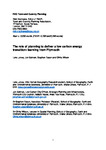The role of planning to deliver a low carbon energy transition: learning from Plymouth
| dc.contributor.author | Jones, L | |
| dc.contributor.author | Selman, J | |
| dc.contributor.author | ESSEX, Stephen | |
| dc.contributor.author | Wilson, O | |
| dc.date.accessioned | 2021-11-15T14:27:32Z | |
| dc.identifier.issn | 0040-9960 | |
| dc.identifier.uri | http://hdl.handle.net/10026.1/18367 | |
| dc.description.abstract |
Given the urgency presented by climate change and global warming, local planning authorities have become active agents in the low carbon energy transition. This transition has been defined as “a radical, systemic and managed change towards a ‘more sustainable’ or ‘more effective’ patterns of provision and use of energy” (Rutherford and Coutard, 2014, p.1354). It is associated with a shift from centralised fossil fuel production and distribution of energy (such as coal, gas and oil) to more decentralised renewable energy production (such as solar and wind), which is consumed on-site or locally. Alongside other government policy interventions, such as carbon emission reduction targets, renewables obligations, feed-in tariffs, voluntary codes and capital grants, local authority planners can provide strategic direction through policies formulated in local development plans (Local Plans) as well as by influencing technological innovation in the built environment through development management decisions on planning applications (Williams, 2010). The aim of this paper is to evaluate the outcomes of Plymouth City Council’s planning policy CS20 Sustainable Resource Use (based on the ‘Merton rule’), which was implemented between 2007 and 2019, and had the purpose to increase the amount of renewable energy delivered as part of developments that came forward during this time period (and so to reduce carbon emissions). | |
| dc.language.iso | en | |
| dc.publisher | Town and Country Planning Association | |
| dc.title | The role of planning to deliver a low carbon energy transition: learning from Plymouth | |
| dc.type | journal-article | |
| plymouth.journal | Town and country planning : the quarterly review of the Town and Country Planning Association | |
| plymouth.organisational-group | /Plymouth | |
| plymouth.organisational-group | /Plymouth/Faculty of Science and Engineering | |
| plymouth.organisational-group | /Plymouth/Faculty of Science and Engineering/School of Geography, Earth and Environmental Sciences | |
| plymouth.organisational-group | /Plymouth/REF 2021 Researchers by UoA | |
| plymouth.organisational-group | /Plymouth/REF 2021 Researchers by UoA/UoA14 Geography and Environmental Studies | |
| plymouth.organisational-group | /Plymouth/Research Groups | |
| plymouth.organisational-group | /Plymouth/Research Groups/Centre for Research in Environment and Society (CeRES) | |
| plymouth.organisational-group | /Plymouth/Research Groups/Centre for Research in Environment and Society (CeRES)/CeRES (Reporting) | |
| plymouth.organisational-group | /Plymouth/Research Groups/Marine Institute | |
| plymouth.organisational-group | /Plymouth/Users by role | |
| plymouth.organisational-group | /Plymouth/Users by role/Academics | |
| dcterms.dateAccepted | 2021-09-10 | |
| dc.rights.embargodate | 2024-03-23 | |
| rioxxterms.licenseref.uri | http://www.rioxx.net/licenses/all-rights-reserved | |
| rioxxterms.type | Journal Article/Review |


